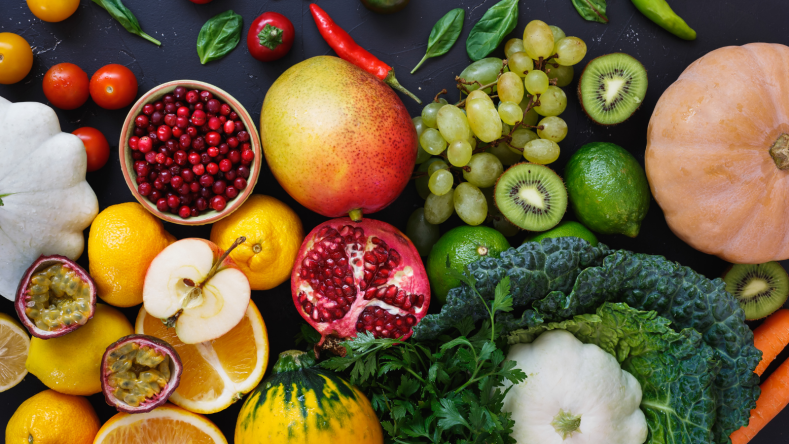What should female runners eat?
This question is about Nutrition and Running
Curious what female runners should eat? Whether you’re a sprinter or a long-distance female runner, all runners should eat a wide variety of minimally processed, whole foods every day, with a special focus on complex carbohydrates, lean protein, healthy fats, iron, calcium, and electrolyte-rich foods.
Complex carbohydrates: Complex carbohydrates, like those found in whole grains, potatoes, brown rice, beans, lentils, fruit, vegetables, and pasta, are an excellent source of energy for runners. These carbs are particularly good for replenishing muscle glycogen before and after a run. Because the body has limited carbohydrate stores, runners can benefit from incorporating complex carbohydrates in all meals and snacks. If your digestive tract is easily excited by fiber, you may want to hold off on those high-fiber foods until after your run.
Lean protein: Runners need protein to build and repair muscle tissue after training. Good sources include fish, chicken, turkey, eggs, Greek yogurt, beans, peas, lentils, quinoa, and tofu. For optimal post-run recovery, aim to consume a mix of complex carbohydrates and lean protein within 60 minutes of finishing a run.
Healthy fats: Quality fats (such as polyunsaturated and omega-3 fats found in fatty fish, avocados, nuts, and seeds) can support hormonal health and reduce inflammation, both of which are important for runners. Omega-3 fats in particular can have big benefits for runners as they reduce inflammation early in the inflammatory cascade and have been shown to be beneficial for muscle recovery post-exercise, heart health, liver function, metabolic health, and more [
1
,2
,3
].Iron: Iron is incredibly important for runners as it is a key component of hemoglobin, a protein in red blood cells that transports oxygen to your working muscles when you run. Deficiency, with or without anemia, can impair muscle function and limit work capacity [
4
]. Good sources of iron include lean red meat (limited to 1-2 times/week), mussels, oysters, sardines, beans, tofu, enriched grains and cereals, and dried apricots.Calcium: Calcium plays a critical role in the growth, maintenance, and repair of bone tissue, as well as the regulation of muscle contractions, nerve conduction, and blood clotting. Because women are at increased risk for low bone-mineral density (osteoporosis) and stress fractures, calcium is an especially important electrolyte for female runners [
5
,6
]. Female runners should aim to get 1,000 mg of calcium/day from food and supplements. Good sources of calcium include dairy products (milk, yogurt, cheese), dark leafy greens, soybeans, certain brands of tofu (be sure to check the label), and fortified foods like breakfast cereals, orange juice, and soy milk.Other electrolytes: Other electrolytes like sodium, potassium, magnesium, and chloride are electrically-charged minerals that play a critical role in muscle and nerve function and help regulate fluid balance. Calcium is one such electrolyte that is especially important for runners as it’s required for the growth, maintenance, and repair of bone tissue. Since the body’s electrolyte needs increase with high-impact exercise like running, it’s recommended to include certain nutrient-rich foods in your diet. Fresh fruits and veggies and coconut water are natural sources of electrolytes, whole milk, yogurt, cheese, and some types of tofu are good sources of calcium.
How much of these foods and the individual nutrients you need will vary from person to person. If you’re looking to optimize your nutrition for running, read our complete guide for improving your running performance

People also ask:
References
Office of dietary supplements - omega-3 fatty acids. (2020, October 1). Retrieved February 03, 2021, from
https://ods.od.nih.gov/factsheets/Omega3FattyAcids-Consumer/
VanDusseldorp, T. A., Escobar, K. A., Johnson, K. E., Stratton, M. T., Moriarty, T., Kerksick, C. M., Mangine, G. T., Holmes, A. J., Lee, M., Endito, M. R., & Mermier, C. M. (2020). Impact of Varying Dosages of Fish Oil on Recovery and Soreness Following Eccentric Exercise. Nutrients, 12(8), 2246.
https://doi.org/10.3390/nu12082246
Marshall, R. N., Smeuninx, B., Morgan, P. T., & Breen, L. (2020). Nutritional Strategies to Offset Disuse-Induced Skeletal Muscle Atrophy and Anabolic Resistance in Older Adults: From Whole-Foods to Isolated Ingredients. Nutrients, 12(5), 1533.
https://doi.org/10.3390/nu12051533
Thomas, D. T., Erdman, K. A., & Burke, L. M. (2016). Position of the Academy of Nutrition and Dietetics, Dietitians of Canada, and the American College of Sports Medicine: Nutrition and Athletic Performance. Journal of the Academy of Nutrition and Dietetics, 116(3), 501–528.
https://doi.org/10.1016/j.jand.2015.12.006
Mayo Clinic Staff. (2021, August 21). Osteoporosis. Mayo Clinic. Retrieved February 4, 2022, from
https://www.mayoclinic.org/diseases-conditions/osteoporosis/symptoms-causes/syc-20351968
Wentz, L., Liu, P. Y., Haymes, E., & Ilich, J. Z. (2011). Females have a greater incidence of stress fractures than males in both military and athletic populations: a systemic review. Military medicine, 176(4), 420–430.
https://doi.org/10.7205/milmed-d-10-00322
\n\n
"}}]}